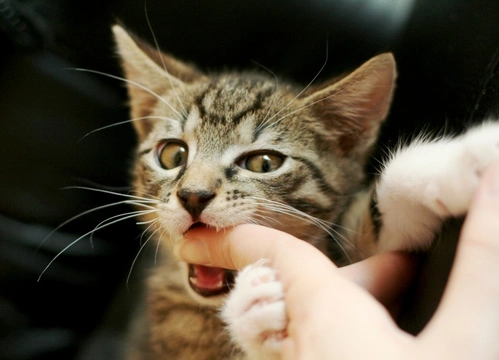
Why does my cat bite me?
Cats might not be able to inflict quite as much potential damage with a bite as dogs can, but as anyone who has been on the receiving end of Kitty’s ire will know, a bite from those razor-sharp teeth can be very painful, as well as having the real ability to cause some serious damage too.
Assuming that your cat is a pet that you know well rather than a wild or feral cat, or one that you adopted knowing that they had some issues that need working through, it can be quite a shock if your cat bites you – particularly if they seem to default to using their teeth for no real reason.
Whether your cat seems to attack out of the blue or only nips you in certain situations, knowing why your cat bites is the key to resolving the issue.
However, we’re not as good at reading feline body language and understanding cat communication as we are with dogs, which can make things more of a challenge. In this article, we will look at the six most likely reasons for your cat biting you, to give you a head start on tackling the issue. Read on to learn more.
Pain or discomfort
First of all, if your cat is in pain or feeling unwell, this will make them rather grumpy and less tolerant of contact with people. Cats are adept at masking pain and acting as if everything is fine when something is amiss, which means that the first indication that something is wrong might be your cat’s unusual behaviour – such as biting.
If petting or handling your cat exacerbates pain, they are apt to lash out – and even if you don’t actually accidentally hurt them, they may bite defensively to encourage you to keep a distance.
Get your cat checked out by the vet if they start biting you for no reason, to get to the bottom of the issue.
Overstimulation
Even though cats spend large amounts of their day asleep, they can be very energetic during their periods of wakefulness, going out hunting, exploring, and investigating the world. Many cats also like to play with toys, and will be quick to join in if you start trailing a ribbon around or joining in with your cat in interactive play – and many cats take games and mock-hunting of this type very seriously.
Watching and joining in with your cat when they’re playing or simulating hunting behaviour can be very rewarding for both of you, as well as helping to keep your cat fit – but if your cat becomes overstimulated during play, they may bite or lash out without thinking, and potentially deliver a nasty bite.
Keep an eye on playtime to ensure that your cat isn’t becoming too wound up or overstimulated, and when the time is right, call an end to the game and give your cat some food or a treat as a reward and to signal the end of the play.
Brain aging
When cats pass from maturity into old age, their brains naturally begin the slow end-of-life decline that we associate with aging, which can lead to a range of personality changes such as disorientation, confusion, out-of-character behaviours, and potentially, aggression.
This can in turn lead to your cat displaying strange behaviours and reactions such as aggression towards their owners, and so it is wise to again ask your vet to check your cat out to ensure that there isn’t a physical reason for their discomfort, and to discuss how you can support your cat in their old age.
Mistaken identity
If your cat pounces on your fingers or toes and delivers a sharp bite before zooming off, they might be trying to entice you into a game without really registering that a bite is painful – but it is just as likely that your cat is suffering from a case of mistaken identity!
If your bare toes are poking out from underneath the duvet or peeking out from under the bottom of your hem, your cat might catch a little movement and pounce on their “prey,” without really registering that those tiny “mice” are actually connected to you!
Kitten memories
Even very small kittens have sharp teeth and claws, but because kittens are so adorable, we often ignore or even find it funny when kittens nip or pounce on people as part of play and learning.
However, if your kitten learns that this is ok and you don’t gently correct them or otherwise indicate to them that it hurts, they will grow up thinking that this behaviour is normal or even desirable, which can make it harder to correct later on in life.
Insecurity
Cats don’t deal well with change, and like to have consistency in their home and environment, as well as a familiar territory outside of the home. If your cat feels unsettled, insecure or unhappy at home – perhaps because of a recent upheaval, because you have got a new cat, or because another cat is invading their territory – this can cause your cat to act out, which may include biting and aggression.
Think carefully about anything at home that might be disturbing or upsetting your cat, and work to resolve it, and you will generally find that this will resolve the issue as well.



